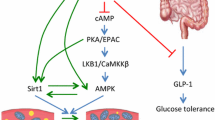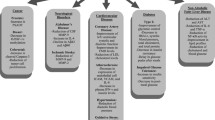Abstract
Obesity is a major health problem throughout the world, and it is increasing both in prevalence and severity. Pharmaceutical approaches developed for the treatment of obesity, despite short-term benefits, often are associated with rebound weight gain after the cessation of drug use and serious side effects deriving from the medication can occur. Resveratrol has been well recognized as an anti-obesity substance for its lipid-lowering function as well as calorie-restriction effect. This polyphenol induces hormetic dose responses in a wide range of biological models, affecting numerous endpoints of biomedical and therapeutic significance. From an hormetic standpoint, we will discuss the potential relevance of resveratrol in the management of obesity and related comorbid conditions, emphasizing its ability to control simultaneously various pathological mechanisms associated with obesity.


Similar content being viewed by others
Abbreviations
- (CR):
-
Calorie restriction
- (WAT):
-
White adipose tissue
- (NF-kβ):
-
Nuclear factor- kβ
- (SIRT-1):
-
Sirtuin-1
- (AMPK):
-
Adenosine monophosphate activated protein kinase
- (FABP4):
-
Fatty acid binding protein 4
- (MCP-1):
-
Monocyte chemoattractant protein-1
- (LPL):
-
Lipoprotein lipase
- (IL)-:
-
Interleukin
- (FOXO):
-
Forkhead Box O
- (MMP):
-
Metalloproteinase
- (SREBP-1c):
-
Sterol regulatory element binding protein-1c
- (TNF-α):
-
Tumor necrosis factor-alpha
- (FAS):
-
Fatty acid synthase
- (C/EBPα):
-
CCAAT/enhancer binding protein α
- (PPARγ):
-
Peroxisome proliferator-activated receptor-γ
- (PGC-1α):
-
Peroxisome proliferator-activated receptor γ coactivator-1α.
References
Almeida L, Vaz-da-Silva M, Falcão A, Soares E, Costa R, Loureiro AI, Fernandes-Lopes C, Rocha JF, Nunes T, Wright L, Soares-da-Silva P (2009) Pharmacokinetic and safety profile of trans-resveratrol in a rising multiple-dose study in healthy volunteers. Mol Nutr Food Res 53:7–15
Avogaro A, de Kreutzenberg SV (2005) Mechanisms of endothelial dysfunction in obesity. Clin Chim Acta 360:9–26
Barger JL (2013) An adipocentric perspective of resveratrol as a calorie restriction mimetic. Ann N Y Acad Sci 1290:122–129
Barger JL, Kayo T, Vann JM, Arias EB, Wang J, Hacker TA, Wang Y, Raederstorff D, Morrow JD, Leeuwenburgh C, Allison DB, Saupe KW, Cartee GD, Weindruch R, Prolla TA (2008) PLoS ONE 3:e2264
Barrajón-Catalán E, Herranz-López M, Joven J, Segura-Carretero A, Alonso-Villaverde C, Menéndez JA, Micol V (2014) Molecular promiscuity of plant polyphenols in the management of age-related diseases: far beyond their antioxidant properties. Adv Exp Med Biol 824:141–159
Baur JA, Pearson KJ, Price NL, Jamieson HA, Lerin C, Kalra A, Prabhu VV, Allard JS, Lopez-Lluch G, Lewis K, Pistell PJ, Poosala S, Becker KG, Boss O, Gwinn D, Wang M, Ramaswamy S, Fishbein KW, Spencer RG, Lakatta EG, Le Couteur D, Shaw RJ, Navas P, Puigserver P, Ingram DK, de Cabo R, Sinclair DA (2006) Resveratrol improves health and survival of mice on a high-calorie diet. Nature 444:337–342
Blackburn GL, Miller D, Chan S (1997) Pharmaceutical treatment of obesity. Nurs Clin North Am 32:831–838
Bracale R, Petroni ML, Davinelli S, Bracale U, Scapagnini G, Carruba MO, Nisoli E (2014) Muscle uncoupling protein 3 expression is unchanged by chronic ephedrine/caffeine treatment: results of a double blind, randomised clinical trial in morbidly obese females. PLoS ONE 9:e98244
Brown VA, Patel KR, Viskaduraki M, Crowell JA, Perloff M, Booth TD, Vasilinin G, Sen A, Schinas AM, Piccirilli G, Brown K, Steward WP, Gescher AJ, Brenner DE (2010) Repeat dose study of the cancer chemopreventive agent resveratrol in healthy volunteers: safety, pharmacokinetics, and effect on the insulin-like growth factor axis. Cancer Res 70:9003–9011
Calabrese EJ, Mattson MP, Calabrese V (2010a) Dose response biology: the case of resveratrol. Hum Exp Toxicol 29:1034–1037
Calabrese V, Cornelius C, Dinkova-Kostova AT, Calabrese EJ, Mattson MP (2010b) Cellular stress responses, the hormesis paradigm, and vitagenes: novel targets for therapeutic intervention in neurodegenerative disorders. Antioxid Redox Signal 13:1763–1811
Calabrese V, Cornelius C, Dinkova-Kostova AT, Iavicoli I, Di Paola R, Koverech A, Cuzzocrea S, Rizzarelli E, Calabrese EJ (2012) Cellular stress responses, hormetic phytochemicals and vitagenes in aging and longevity. Biochim Biophys Acta 1822:753–783
Carrizzo A, Forte M, Damato A, Trimarco V, Salzano F, Bartolo M, Maciag A, Puca AA, Vecchione C (2013) Antioxidant effects of resveratrol in cardiovascular, cerebral and metabolic diseases. Food Chem Toxicol 61:215–226
Catterall F, Souquet JM, Cheynier V, de Pascual-Teresa S, Santos-Buelga C, Clifford MN, Ioannides C (2000) Differential modulation of the genotoxicity of food carcinogens by naturally occurring monomeric and dimeric polyphenolics. Environ Mol Mutagen 35:86–98
Fuentes E, Fuentes F, Vilahur G, Badimon L, Palomo I (2013) Mechanisms of chronic state of inflammation as mediators that link obese adipose tissue and metabolic syndrome. Mediat Inflamm 2013:136584
Gómez-Zorita S, Fernández-Quintela A, Lasa A, Hijona E, Bujanda L, Portillo MP (2013) Effects of resveratrol on obesity-related inflammation markers in adipose tissue of genetically obese rats. Nutrition 29:1374–1380
González-Castejón M, Rodriguez-Casado A (2011) Dietary phytochemicals and their potential effects on obesity: a review. Pharmacol Res 64:438–455
Jeon BT, Jeong EA, Shin HJ, Lee Y, Lee DH, Kim HJ, Kang SS, Cho GJ, Choi WS, Roh GS (2012) Resveratrol attenuates obesity-associated peripheral and central inflammation and improves memory deficit in mice fed a high-fat diet. Diabetes 61:1444–1454
Kang L, Heng W, Yuan A, Baolin L, Fang H (2010) Resveratrol modulates adipokine expression and improves insulin sensitivity in adipocytes: Relative to inhibition of inflammatory responses. Biochimie 92:789–796
Kang NE, Ha AW, Kim JY, Kim WK (2012) Resveratrol inhibits the protein expression of transcription factors related adipocyte differentiation and the activity of matrix metalloproteinase in mouse fibroblast 3 T3-L1 preadipocytes. Nutr Res Pract 6:499–504
Kwon JY, Seo SG, Yue S, Cheng JX, Lee KW, Kim KH (2012) An inhibitory effect of resveratrol in the mitotic clonal expansion and insulin signaling pathway in the early phase of adipogenesis. Nutr Res 32:607–616
Lee J, Jo DG, Park D, Chung HY, Mattson MP (2014) Adaptive cellular stress pathways as therapeutic targets of dietary phytochemicals: focus on the nervous system. Pharmacol Rev 66:815–868
Mattson MP, Cheng A (2006) Neurohormetic phytochemicals: Low-dose toxins that induce adaptive neuronal stress responses. Trends Neurosci 29:632–639
Mennen LI, Walker R, Bennetau-Pelissero C, Scalbert A (2005) Risks and safety of polyphenol consumption. Am J Clin Nutr 81:326S–329S
Naderali EK (2009) Obesity and cardiovascular dysfunction: a role for resveratrol? Obes Res Clin Pract 3:45–52
Panickar KS (2013) Effects of dietary polyphenols on neuroregulatory factors and pathways that mediate food intake and energy regulation in obesity. Mol Nutr Food Res 57:34–47
Pervaiz S, Holme AL (2009) Resveratrol: its biologic targets and functional activity. Antioxid Redox Signal 11:2851–2897
Picard F, Kurtev M, Chung N, Topark-Ngarm A, Senawong T, Machado De Oliveira R, Leid M, McBurney MW, Guarente L (2004) Sirt1 promotes fat mobilization in white adipocytes by repressing PPAR-gamma. Nature 429:771–776
Poirier P, Giles TD, Bray GA, Hong Y, Stern JS, Pi-Sunyer FX, Eckel RH (2006) Obesity and cardiovascular disease: pathophysiology, evaluation, and effect of weight loss. Arterioscler Thromb Vasc Biol 26:968–976
Poulsen MM, Jørgensen JO, Jessen N, Richelsen B, Pedersen SB (2013a) Resveratrol in metabolic health: an overview of the current evidence and perspectives. Ann N Y Acad Sci 1290:74–82
Poulsen MM, Vestergaard PF, Clasen BF, Radko Y, Christensen LP, Stødkilde-Jørgensen H, Møller N, Jessen N, Pedersen SB, Jørgensen JO (2013b) High-dose resveratrol supplementation in obese men: an investigator-initiated, randomized, placebo-controlled clinical trial of substrate metabolism, insulin sensitivity, and body composition. Diabetes 62:1186–1195
Price NL, Gomes AP, Ling AJ, Duarte FV, Martin-Montalvo A, North BJ, Agarwal B, Ye L, Ramadori G, Teodoro JS, Hubbard BP, Varela AT, Davis JG, Varamini B, Hafner A, Moaddel R, Rolo AP, Coppari R, Palmeira CM, de Cabo R, Baur JA, Sinclair DA (2012) SIRT1 is required for AMPK activation and the beneficial effects of resveratrol on mitochondrial function. Cell Metab 15:675–690
Quideau S, Deffieux D, Douat-Casassus C, Pouységu L (2011) Plant polyphenols: chemical properties, biological activities, and synthesis. Angew Chem Int Ed Engl 50:586–621
Rayalam S, Yang JY, Ambati S, Della-Fera MA, Baile CA (2008) Resveratrol induces apoptosis and inhibits adipogenesis in 3 T3-L1 adipocytes. Phytother Res 22:1367–1371
Sun Y, Li J, Xiao N, Wang M, Kou J, Qi L, Huang F, Liu B, Liu K (2014) Pharmacological activation of AMPK ameliorates perivascular adipose/endothelial dysfunction in a manner interdependent on AMPK and SIRT1. Pharmacol Res 89:19–28
Tang PC, Ng YF, Ho S, Gyda M, Chan SW (2014) Resveratrol and cardiovascular health - Promising therapeutic or hopeless illusion? Pharmacol Res pii:S1043-6618(14)00138-8
Timmers S, Konings E, Bilet L, Houtkooper RH, van de Weijer T, Goossens GH, Hoeks J, van der Krieken S, Ryu D, Kersten S, Moonen-Kornips E, Hesselink MK, Kunz I, Schrauwen-Hinderling VB, Blaak EE, Auwerx J, Schrauwen P (2011) Calorie restriction-like effects of 30 days of resveratrol supplementation on energy metabolism and metabolic profile in obese humans. Cell Metab 14:612–622
Tomé-Carneiro J, Gonzálvez M, Larrosa M, Yáñez-Gascón MJ, García-Almagro FJ, Ruiz-Ros JA, Tomás-Barberán FA, García-Conesa MT, Espín JC (2013) Grape resveratrol increases serum adiponectin and downregulates inflammatory genes in peripheral blood mononuclear cells: a triple-blind, placebo-controlled, one-year clinical trial in patients with stable coronary artery disease. Cardiovasc Drugs Ther 27:37–48
Wang S, Moustaid-Moussa N, Chen L, Mo H, Shastri A, Su R, Bapat P, Kwun I, Shen CL (2014) Novel insights of dietary polyphenols and obesity. J Nutr Biochem 25:1–18
Wellman NS, Friedberg B (2002) Causes and consequences of adult obesity: health, social and economic impacts in the United States. Asia Pac J Clin Nutr Suppl 8:705–709
Wong RH, Howe PR, Buckley JD, Coates AM, Kunz I, Berry NM (2011) Acute resveratrol supplementation improves flow-mediated dilatation in overweight/obese individuals with mildly elevated blood pressure. Nutr Metab Cardiovasc Dis 21:851–856
Yoshino J, Conte C, Fontana L, Mittendorfer B, Imai S, Schechtman KB, Gu C, Kunz I, Rossi Fanelli F, Patterson BW, Klein S (2013) Resveratrol supplementation does not improve metabolic function in nonobese women with normal glucose tolerance. Cell Metab 16:658–664
Zhang XH, Huang B, Choi SK, Seo JS (2012) Anti-obesity effect of resveratrol-amplified grape skin extracts on 3 T3-L1 adipocytes differentiation. Nutr Res Pract 6:286–293
Author information
Authors and Affiliations
Corresponding author
Rights and permissions
About this article
Cite this article
Scapagnini, G., Davinelli, S., Kaneko, T. et al. Dose response biology of resveratrol in obesity. J. Cell Commun. Signal. 8, 385–391 (2014). https://doi.org/10.1007/s12079-014-0257-3
Received:
Accepted:
Published:
Issue Date:
DOI: https://doi.org/10.1007/s12079-014-0257-3




